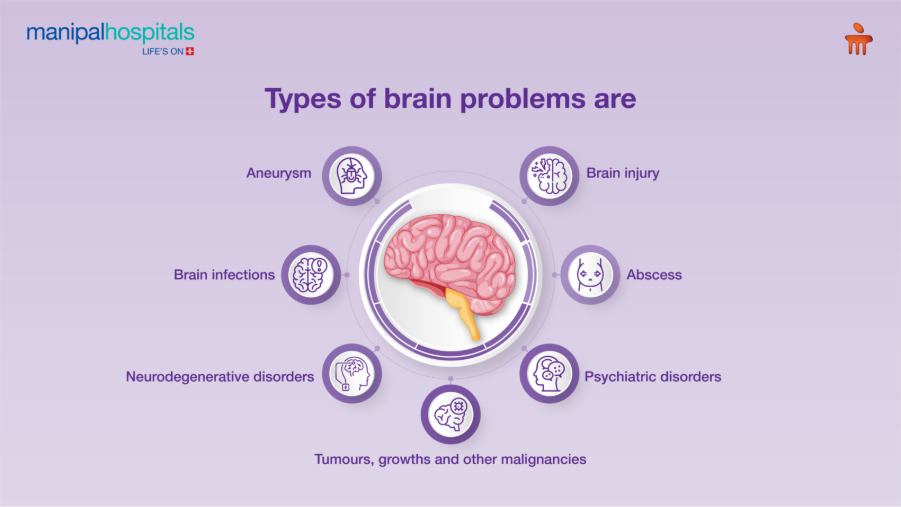
The brain is the control centre of the body. It is part of the central nervous system (CNS) which also includes the spinal cord and billions of nerve cells. When conditions like infection, injury, or tumours disrupt this control, they lead to brain problems. Understanding the causes of these brain problems, their symptoms and treatments are vital for early care and recovery.
Synopsis
What is Brain Problem?
When any condition affects the way the brain normally functions, it is called brain problem. Brain problems may have an impact on speech, memory, and behaviour, depending on what part of the brain is affected. This is why, early detection is crucial as it helps prevent long-term complications.
Causes of Brain Problems
Brain problems can have a variety of causes based on their type. Some common causes for brain disease are:
-
Genetics: Genetics often pass down diseases from previous generation to the next, including brain problems. Neurodegenerative diseases, stroke, and seizures are often seen in families with genetic mutations.
-
Pathogens: Certain pathogens may cause infections leading to brain disease. They can be fatal if not treated promptly.
-
Accidents: accidents, falls or injuries from sports or physical activities are largely responsible for traumatic brain injuries (TBI) and concussions.
-
Environmental toxins: long-term exposure to pesticides, radiation, and heavy metals can increase the risk of getting brain disease, including brain tumour and other neurodegenerative disorders.
-
Lifestyle habits: Sedentary lifestyle, smoking, excess drinking and extreme stress can cause conditions with risk of brain problems and degrade brain health.
-
Medical conditions: Some pre-existing medical conditions, like hypertension, diabetes and high cholesterol levels, increase risks of stroke and aneurysm.
Types of Brain Problems and their Symptoms
Some commonly known forms of brain disease are discussed below:

-
Brain Infections: pathogens like bacteria, virus, amoeba and other parasites can cause serious inflammation in the brain. Meningitis, encephalitis and brain abscess are some common, yet fatal brain diseases that can kill you if not treated timely.
-
Symptoms of brain infection are headache, nausea, confusion and lack of consciousness. Extreme lethargy and irritability may act as symptoms in babies.
-
Seizures: Seizures are sudden, rapid and uncontrollable jerking movements that last from several seconds to a few minutes. Seizures are a common symptom for epilepsy, but they may also happen from injury, infections, poor mental health or toxicity.
-
Brain injury: Incidents like falls, vehicular accident or a forceful blow to the head can result in Traumatic Brain Injury (TBI) or concussion. Quick action during such cases is extremely important to avoid fatalities. Nausea, dizziness and headache are some symptoms for a concussion, but traumatic brain injuries may result to coma or death.
-
Brain Tumours: Brain tumour is an abnormal mass of tissue in the brain that can either be benign or malignant. It exerts pressure on the brain, and affects speech, vision and other neuro disorder symptoms.
-
Neurodegenerative disorders: They are progressive, age-related brain problems which degrade the nerves of the brain. Alzheimer’s, Parkinson’s disease, dementia, and amyotrophic lateral sclerosis (ALS) are some common examples of neurodegenerative disorders. Loss of memory is a common symptom, but loss of speech and motor skills are also seen as these diseases progress.
-
Psychiatric disorders: Conditions like depression, anxiety, bipolar disorder or schizophrenia can degrade brain health, thereby affecting all-over health of the affected person.
Treatment for Brain Problems
Treatment for brain problems depends on its types and symptoms. While some are managed with medication, others may require consistent therapeutic management or even surgery.
-
Medication: Medication is often used to treat or manage symptoms of brain problems. Certain conditions like migraines, some infections as well as psychiatric disease are usually managed with medication. Some medical conditions which may cause brain problems are also managed with medication.
-
Vaccinations: Vaccinations are largely being used to prevent certain brain problems, especially meningitis in children.
-
Therapy: Psychiatric conditions like depression and anxiety are managed with prolonged psychotherapy alongside medication. Neurodegenerative conditions like Parkinson’s and Alzheimer’s are managed with supportive therapy to delay progression. Many other brain problems are also managed with therapeutic options.
-
Surgery: When certain brain problems become life-threatening, then surgery remains as the only option. For cases like brain tumours, abscesses and aneurysms, surgery is the only viable option.
Conclusion
Brain problems can affect one’s physical health significantly, but it also takes a huge toll on mental health, relationships and quality of life of both the patient and their families. Early diagnosis and prompt treatment can make a huge difference, bringing hope, relief and a new lease on life. At Manipal Hospitals, our dedicated team of experts provides personalised treatment plants, helping patients regain their strength and confidence. If you are experiencing persistent headaches, vision problems or other cognitive disorders, do not ignore them. Every moment counts when it comes to protecting your brain health. Visit your nearest Manipal Hospitals unit today for expert neuro care.
FAQ's
The frontal lobe of the brain is responsible for managing emotions and personality. When this lobe is damaged due to stroke or seizure, it can cause significant changes in behaviour and emotions. This phenomenon is called Frontal Lobe Syndrome.
Chronic stress and depression increase cortisol levels, which can damage neurons in the hippocampus region of the brain. This can cause loss of memory, and even structural shrinkage over time.
Stagnant lakes, rivers or swimming pools can be a breeding ground for brain-eating amoeba called Naegleria fowleri. Swimming in such waters allows them to travel to the brain via the nose. It causes Primary Amebic Meningoencephelitis, a deadly brain disease.
You should consult a doctor if you are experiencing persistent headaches with nausea, pressure on any side of your head, blurred vision, issues with memory and other neurocognitive symptoms.
Covid-19 caused a variety of effects in infected people, including neurological effects like loss of smell, brain fog and even cognitive decline in some. This phenomenon was termed as neuro-covid






















 8 Min Read
8 Min Read










